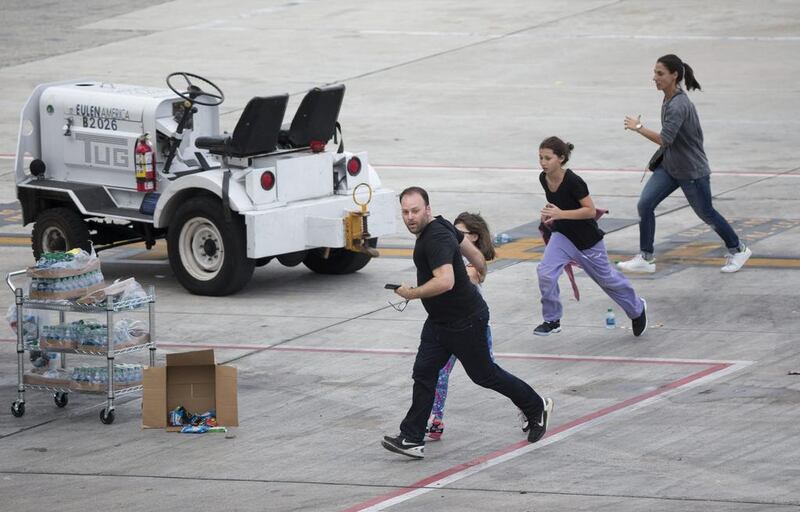MIAMI // The Iraq war veteran who shot dead five people in the baggage claim area of Florida’s Fort Lauderdale airport on Friday had apparently travelled there specifically to carry out his attack, investigators said.
Esteban Santiago, 26, had cooperated with investigators during questioning that lasted several hours overnight, George Piro, special agent in charge of the FBI office in Miami, said on Saturday.
“Indications are he came here to carry out this horrific attack,” Mr Piro said.
He said there were no signs that there was an altercation on the flight or at the baggage claim before the attack.
Six people were wounded when Mr Santiago opened fire with a pistol, authorities said, two fewer than previously thought.
Mr Piro said investigators were not ruling out terrorism as a potential motive.
“We continue to look at all avenues and all motives for this horrific attack,” he said. “We are continuing to look at the terrorism angle in regards to the potential motivation behind this attack.”
He said Mr Santiago appeared to be acting alone and that “every indication is that he did follow procedures in checking in the weapon”, a 9mm semi-automatic handgun he had declared and stowed inside his checked luggage.
Mr Santiago had travelled from Alaska to Fort Lauderdale, with a stopover in Minneapolis, Minnesota.
In November, he had walked into the FBI’s Anchorage office exhibiting “erratic behaviour” that led agents to contact local police, who took him to a medical facility for a mental health evaluation, Mr Piro said.
However, he was not placed on a no-fly list, he said.
Mr Santiago’s brother on Saturday questioned why US authorities allowed him to keep his gun after being told he had become increasingly paranoid and was hearing voices.
Bryan Santiago said that after serving in the National Guard in Iraq, his brother had trouble controlling his anger and told him that he felt he was being chased and being controlled by the CIA through secret online messages. But when he told agents his paranoid thoughts in November, he was evaluated for four days, then released without any follow-up medication or therapy.
“The FBI failed there. We’re not talking about someone who emerged from anonymity to do something like this,” Bryan Santiago said from the family’s home in Penuelas in Puerto Rico.
His mother said Esteban had been tremendously affected by seeing a bomb explode next to two of his friends during a one-year tour of Iraq when he was about 18 years old.
Debbie Schultz, a member of congress who represents the district that includes the airport, said the incident also brought into question federal rules that allowed firearms to be carried on a plane in checked baggage.
“We need to review not only the question of should people be able to travel with the firearm or even if they’re in checked baggage, but we need to take a hard look at the security around baggage claim areas and not just leave it at that,” she said.
“It’s been pointed out that there are many unsecure areas in facilities that the public travels.”
The airport, a hub for flights to the Caribbean, was open again on Saturday and aiming to run at about 85 per cent of its normal capacity, according to its director.
Airport personnel were also busy trying to return nearly 20,000 pieces of luggage and other personal items abandoned by passengers fleeing at the time of the shooting, officials said.
* Reuters, Associated Press and Agence France-Presse





